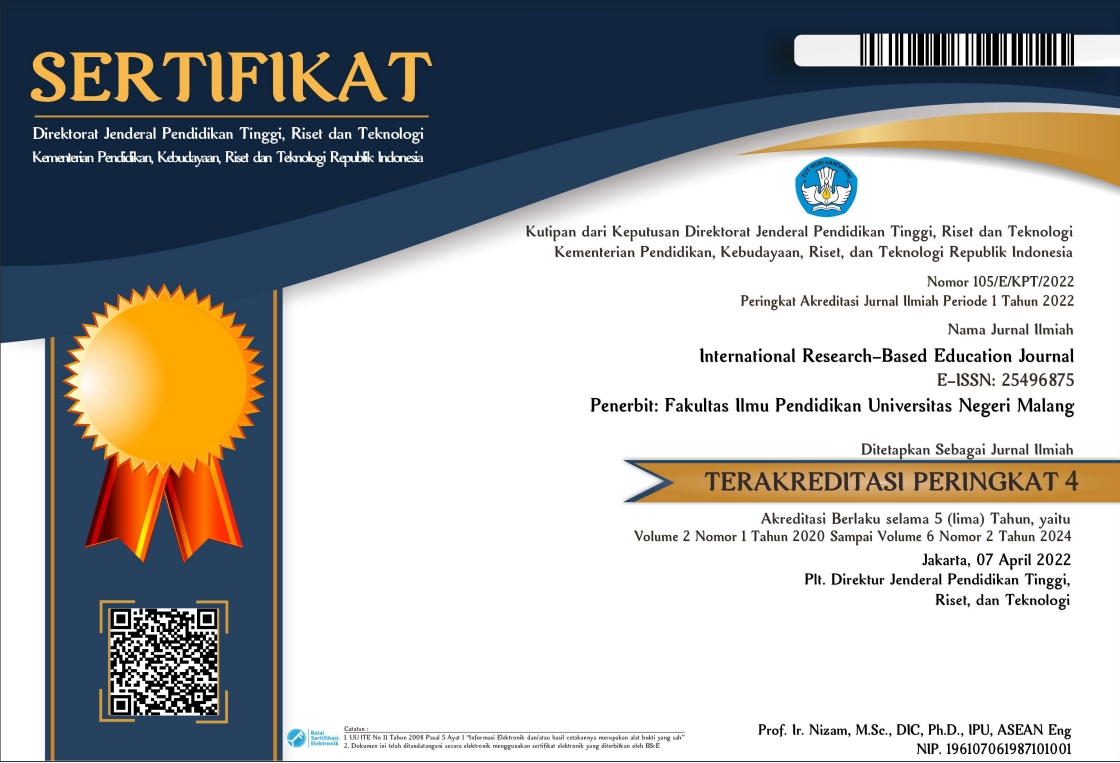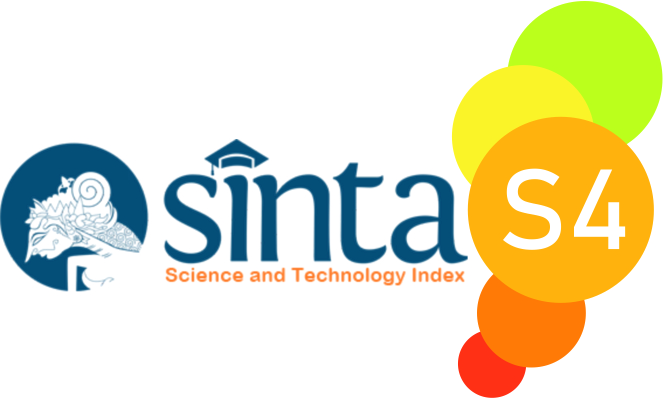“LOST AND FOUND BOX” AS A SCHOOL INNOVATION IN STRENGTHENING THE CHARACTER OF STUDENTS BASED ON INTEGRITY VALUES IN ELEMENTARY SCHOOL
Abstract
Current education programs are directed at the implementation and strengthening of character education in schools. Character education is considered the right solution to solve the problems of the Indonesian nation. The purpose of this study was to determine the planning process for strengthening character education based on integrity values in schools, the implementation of the lost and found box program in schools, and the impact of implementing the lost and found box program in schools. This study used a qualitative descriptive research design with a case study approach. The data collection techniques used in this study were interviews and documentation studies. This research was conducted at Elementary School Laboratory Universitas Negeri Malang, Blitar City, with the principal as the key informant and teacher, education staff and school committee as additional informants. The results of this study shows that planning activities in the integrity value-based character education strengthening program have been divided into learning and non-learning aspects. Program planning is carried out through work meetings involving school principals, teachers, education personnel, parents, school committees, stakeholders, education experts, with the principal as the highest decision maker. The impact of implementing the "Lost and Found Box" program in schools is (1) increased honesty behavior of students, (2) students understand the concept of ownership, (3) students feel responsible for personal property and other people, and (4) school students are felt to be safer.
Keywords
Full Text:
PDFReferences
Adha, M. A., Gordisona, S., Ulfatin, N., & Supriyanto, A. (2019). Analisis Komparasi Sistem Pendidikan Indonesia dan Finlandia. Jurnal Studi Manajemen Pendidikan, 3(2), 145–160. https://doi.org/http://dx.doi.org/10.29240/jsmp.v3i2.110
Alfirevic, N., Burusic, J., Pavicic, J., & Relja, R. (2016). School Effectiveness and Educational Management. Palgrave Macmillan.
Anggraeni, S. A., Amelia, I., Wulandari, P., Oktavianingrum, R., Adha, M. A., Gunawan, R. M., & Juharyanto. (2020). The Efforts of School Principal in Improving Quality of Learning Through Non-Thematic Learning Supervision in Elementary School. Proceedings of the 6th International Conference on Education and Technology (ICET 2020) The, 346–350. https://doi.org/https://dx.doi.org/10.2991/assehr.k.201204.067
Annisa, F. (2018). Planting of Discipline Character Education Values in Basic School Students. International Journal of Educational Dynamics, 1(1), 107–114.
Ariyanti, N. S., Adha, M. A., Sumarsono, R. B., & Sultoni, S. (2020). Strategy to Determine the Priority of Teachers’ Quality Problem Using USG (Urgency, Seriousness, Growth) Matrix. International Research-Based Education Journal, 2(2), 54–62. https://doi.org/10.17977/um043v2i2p54-62
Ash-shidiqqi, E. A. (2018). The Analysis of Character Education in Indonesia. International Journal of Humanities, Art and Social Studies (IJHAS), 3(4), 39–46.
Asmani, J. M. (2012). Buku Panduan Internalisasi Pendidikan Karakter di Sekolah. Diva PRess.
Bagir, H. (2013). Problem Pendidikan Karakter. Kompas.Com.
Bandur, A. (2012). School-Based Management Developments: Challenges and Impacts. Journal of Educational Administration, 50(6), 845–873. https://doi.org/10.1108/09578231211264711
Botha, R. J. (2010). School effectiveness: Conceptualising divergent assessment approaches. South African Journal of Education, 30(4), 605–620. https://doi.org/10.15700/saje.v30n4a391
Fahrilyani, D., Maisyaroh, M., & Kusumaningrum, D. E. (2019). Manajemen Pembinaan Karakter Peserta Didik Di Sekolah Dasar. Jurnal Administrasi Dan Manajemen Pendidikan, 2(4), 204–212. https://doi.org/10.17977/um027v2i42019p204
Fajar, A. (2018). Prevention of Corruption through Anti-Corruption Education. Advances in Social Science, Education and Humanities Research, 251(Acec), 650–653. https://doi.org/https://dx.doi.org/10.2991/acec-18.2018.145
Faller, K. (2016). Schools’ Lost-and-Found Boxes Filled to Bursting at End of Year. Azcentral. https://www.azcentral.com/story/news/local/phoenix/2016/05/20/schools-lost-and-found-boxes-filled-bursting-end-year/84500828/
Farisi, M. I. (2011). Kompetensi Guru dalam Mewujudkan Pendidikan Berkarakter dan berbasis Budaya. Jurnal Teknologi Pendidikan, 11(1), 23–33.
Harmanto. (2014). Pendidikan Anti Korupsi Melalui Budaya Sekolah Berbasis Nilai-Nilai Keislaman. Islamica, 7(1), 100–122.
Harsono, F. H. (2018). Kendala Guru Di Daerah Terluar Menerapkan Penguatan Pendidikan Karakter. Liputan6.Com.
Hasanah. (2013). Implementation of Core Character Values in Higher Education. Jurnal Pendidikan Karakter, 3(2), 186–195.
Jeynes, W. H. (2019). A Meta-Analysis on the Relationship Between Character Education and Student Achievement and Behavioral Outcomes. Education and Urban Society, 51(1), 33–71. https://doi.org/10.1177/0013124517747681
Juharyanto, Bafadal, I., Arifin, I., Saputra, B. R., & Adha, M. A. (2020). The Use of Conventional Communication Technology as an Effective Principal Leadership Strategy in Strengthening the Role of Multi-Stakeholder’s Forum for School Quality Improvement. Elementary Education Online, 19(4), 1963–1973. https://doi.org/10.17051/ilkonline.2020.762773
Juharyanto, J., Sultoni, S., Arifin, I., Bafadal, I., Nurabadi, A., & Hardika, H. (2020). “Gethok Tular” as the Leadership Strategy of School Principals to Strengthen Multi-Stakeholder Forum Role in Improving the Quality of One-Roof Schools in Remote Areas in Indonesia. SAGE Open, 10(2), 1–12. https://doi.org/10.1177/2158244020924374
Kemendikbud. (2011). Pendidikan Anti Korupsi untuk Perguruan Tinggi. Kementerian Pendidikan dan Kebudayaan RI.
Komalasari, K., & Saripudin, D. (2015). Integration of Anti-Corruption Education in School’s Activities. American Journal of Applied Scinces, 12(6), 445–451. https://doi.org/10.3844/ajassp.2015.445.451
Mahmud, M. (2017). Internalisasi Nilai-Nilai Karakter Dalam Meningkatkan Kompetensi Kepribadian Guru Di Sekolah Menengah Pertama Islam Terpadu (SMPIT) Al-Hidayah Sumenep. UIN Maulana Malik Ibrahim.
Maisyaroh, Juharyanto, Bafadal, I., Wiyono, B. B., Adha, M. A., Saputra, B. R., & Ariyanti, N. S. (2020). Implementation of Principal Instructional Leadership in Facilitating Learning Independency Policy on 4 . 0 Industrial Era Orientation in Indonesia. Proceedings of the 2nd Early Childhood and Primary Childhood Education (ECPE 2020) Implementation, 487(Ecpe), 206–211. https://doi.org/https://dx.doi.org/10.2991/assehr.k.201112.037
Maisyaroh, Mustiningsih, Kusumaningrum, D. E., & Nasih, A. M. (2019). Development of the Model of Implementation and Evaluation of the 21st Century Community Participation in the Pesantren-Based Junior High School. International Journal of Innovation, Creativity and Change, 5(4sp), 599–610. https://doi.org/10.2991/icet-19.2019.144
Maisyaroh, Zulkarnain, W., Setyowati, A. J., & Mahanal, S. (2014). Masalah Guru dalam lmplementasi Kurikulum 2013 dan Kerangka Model Supervisi Pengajaran. Jurnal Manajemen Pendidikan, 24(3), 213–220.
Malihah, E. (2015). An ideal Indonesian in an increasingly competitive world: Personal character and values required to realise a projected 2045 ‘Golden Indonesia’. In Citizenship, Social and Economics Education. https://doi.org/10.1177/2047173415597143
Maunah, B. (2015). Implementasi Pendidikan Karakter Dalam Pembentukan Kepribadian Holistik Peserta Didik. Jurnal Pendidikan Karakter, 5(1), 90–101.
Megawangi. (2010). Pengembangan Program Pendidikan Karakter Di Sekolah: Pengalaman Sekolah Karakter. Membangun Profesionalitas Insan Pendidikan Yang Berkarakter Dan Berbasis Budaya, 1–8.
Miles, M. B., Huberman, A. M., & Saldana, J. (2014). Qualitative Data Analysis. Sage.
Muassomah, Abdullah, I., Istiadah, Mujahidin, A., Masnawi, N., & Sohrah. (2020). Believe in Literature: Character Education for Indonesia’s Youth. Universal Journal of Educational Research, 8(6), 2223–2231. https://doi.org/10.13189/ujer.2020.080605
Mustiningsih, Maisyaroh, & Kusumaningrum, D. E. (2019). Development of Planning and Organization Model of Community Participation in the Pesantren Based Junior High School. 5th International Conference on Education and Technology, 382(Icet), 580–583. https://doi.org/10.2991/icet-19.2019.144
OECD. (2020). Education for Integrity. https://nus.org.ua/wp-content/uploads/2020/09/education-for-integrity-web.pdf
Onde, M. L. O., Aswat, H., Fitriani, B., & Sari, E. R. (2020). Integrasi Penguatan Pendidikan Karakter (PPK) Era 4.0 pada Pembelajaran Berbasis Tematik Integratif di Sekolah Dasar. Jurnal BasicEdu, 4(2), 268–279.
Pala, A. (2011). The Need for Character Education. International Journal of Social Sciences and Humanity Studies, 3(2), 23–32.
Pasandaran, S., Katuuk, D., & Sendouw, R. H. E. (2019). Analysis of Teacher Strategy in Developing Character Learning at School. International Journal of Recent Technology and Engineering, 8(2 sp), 271–278.
Pattaro, C. (2016). Character Education: Themes and Researches. An Academic Literature Review. Italian Journal of Sociology of Education, 8(1), 6–30. https://doi.org/10.14658/pupj-ijse-2016-1-2
Peraturan Menteri Pendidikan dan Kebudayaan Nomor 20 Tahun 2018 Tentang Penguatan Pendidikan Karakter Pada Satuan Pendidikan Formal.
Pratiwi, F. D., Gunawan, I., Mahardika, B. A., Nur, C., Amaliah, P. U., Adha, M. A., Lestari, S. P., & Juharyanto. (2020). Principal ’ s Role in Thematic Learning Supervision That Works in Elementary School. Proceedings of the 6th International Conference on Education and Technology (ICET 2020), 501(Icet), 176–181. https://doi.org/https://dx.doi.org/10.2991/assehr.k.201204.031
Rachman, T. (2013). Pendidikan Karakter Solusi Kikis Permasalahan Bangsa ? Republika.Co.Id.
Saidek, A. R., Raisul Islami, & Abdoludin. (2016). Character Issues: Reality Character Problems and Solutions through Education in Indonesia. Journal of Education and Practice, 7(17), 158–165.
Sarmini, Swanda, I. M., & Nadiroh, U. (2017). The Importance of Anti Corruption Education Teaching Materials for The Young Generation. Series: Journal of Physics: Conf. Series, 953, 1–5. https://doi.org/10.1088/1742-6596/953/1/012167
Sukadari, Sukemi, B. M., & Sunarti. (2019). Local Socio-Cultural Wisdom as a Basis of Character Education in Primary Schools. International Journal of Innovation, Creativity and Change, 7(6), 298–311.
The Jubilee Centre for Character & Virtues. (2017). a Framework for Character Education in Schools. University of Birmingham. https://uobschool.org.uk/wp-content/uploads/2017/08/Framework-for-Character-Education-2017-Jubilee-Centre.pdf
Ulfatin, N. (2015). Metode Penelitian Kualitatif di Bidang Pendidikan: Teori dan Aplikasinya. Media Nusa Creative.
Wibowo, A. (2013). Manajemen Pendidikan Karakter Sekolah Konsep dan Praktik Implementasi. Pustaka Belajar.
Wiyani, N. A. (2013). Membumikan Pendidikan Karakter di SD. Ar-Ruzz Media.
Zurqoni, Retnawati, H., Apino, E., & Anazifa, R. D. (2018). Impact of Character Education Implementation: A Goal-Free Evaluation. Problems of Education in the 21st Century, 76(6), 2018. https://doi.org/10.33225/pec/18.76.881
DOI: http://dx.doi.org/10.17977/um043v4i1p14-24
Refbacks
- There are currently no refbacks.

This work is licensed under a Creative Commons Attribution-NonCommercial-ShareAlike 4.0 International License.










1.png)


